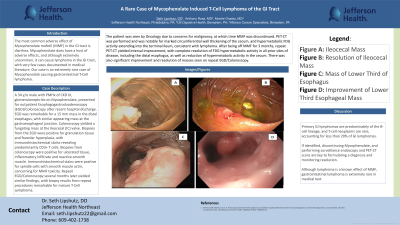Tuesday Poster Session
Category: Colon
P3069 - A Rare Case of Mycophenolate Induced T-Cell Lymphoma of the GI Tract
Tuesday, October 24, 2023
10:30 AM - 4:00 PM PT
Location: Exhibit Hall

Has Audio

Seth Lipshutz, DO
Jefferson Health Northeast
Philadelphia, PA
Presenting Author(s)
Seth Lipshutz, DO1, Anthony Rosa, MD2, Moshe Chasky, MD3
1Jefferson Health Northeast, Philadelphia, PA; 2US Digestive Health, Bensalem, PA; 3Alliance Cancer Specialists, Bensalem, PA
Introduction: The most common adverse effect of Mycophenolate mofetil (MMF) in the GI tract is diarrhea. Mycophenolate does have a host of adverse effects, and although extremely uncommon, it can cause lymphoma in the GI tract, with very few cases documented in medical literature. Our case is an extremely rare case of Mycophenolate causing gastrointestinal T-Cell lymphoma.
Case Description/Methods: A 34 y/o male with PMHx of CKD III, glomerulonephritis on Mycophenolate, presented for outpatient Esophagogastroduodenoscopy (EGD)/Colonoscopy after recent hospital discharge. EGD was remarkable for a 15 mm mass in the distal esophagus, with similar appearing mass at the gastroesophageal junction. Colonoscopy yielded a fungating mass at the Ileocecal (IC) valve. Biopsies from the EGD were positive for granulation tissue and foveolar hyperplasia, with immunohistochemical stains revealing predominantly CD3+ T cells. Biopsies from colonoscopy were positive for ulcerated tissue, inflammatory infiltrate and reactive smooth muscle. Immunohistochemical stains were positive for spindle cells with smooth muscle actin, concerning for MMF toxicity. Repeat EGD/Colonoscopy several months later yielded similar findings, with biopsy results from repeat procedures remarkable for mature T-Cell Lymphoma. The patient was seen by Oncology due to concerns for malignancy, at which time MMF was discontinued. PET-CT was performed and was notable for marked circumferential wall thickening of the cecum, and hypermetabolic FDG activity extending into the terminal ileum, consistent with lymphoma. After being off MMF for 3 months, repeat PET-CT yielded interval improvement, with complete resolution of FDG hypermetabolic activity in all prior sites of disease, including the distal esophagus, as well as reduction of hypermetabolic activity in the cecum. There was also significant improvement and resolution of masses seen on repeat EGD/Colonoscopy.
Discussion: Primary GI lymphomas are predominately of the B-cell lineage, and T-cell neoplasms are rare, accounting for less than 20% of GI lymphomas. If identified, discontinuing Mycophenolate, and performing surveillance endoscopy and CT-PET scans are key to formulating a diagnosis and monitoring resolution. Although lymphoma is a known effect of MMF, gastrointestinal lymphoma is extremely rare in medical text.

Disclosures:
Seth Lipshutz, DO1, Anthony Rosa, MD2, Moshe Chasky, MD3. P3069 - A Rare Case of Mycophenolate Induced T-Cell Lymphoma of the GI Tract, ACG 2023 Annual Scientific Meeting Abstracts. Vancouver, BC, Canada: American College of Gastroenterology.
1Jefferson Health Northeast, Philadelphia, PA; 2US Digestive Health, Bensalem, PA; 3Alliance Cancer Specialists, Bensalem, PA
Introduction: The most common adverse effect of Mycophenolate mofetil (MMF) in the GI tract is diarrhea. Mycophenolate does have a host of adverse effects, and although extremely uncommon, it can cause lymphoma in the GI tract, with very few cases documented in medical literature. Our case is an extremely rare case of Mycophenolate causing gastrointestinal T-Cell lymphoma.
Case Description/Methods: A 34 y/o male with PMHx of CKD III, glomerulonephritis on Mycophenolate, presented for outpatient Esophagogastroduodenoscopy (EGD)/Colonoscopy after recent hospital discharge. EGD was remarkable for a 15 mm mass in the distal esophagus, with similar appearing mass at the gastroesophageal junction. Colonoscopy yielded a fungating mass at the Ileocecal (IC) valve. Biopsies from the EGD were positive for granulation tissue and foveolar hyperplasia, with immunohistochemical stains revealing predominantly CD3+ T cells. Biopsies from colonoscopy were positive for ulcerated tissue, inflammatory infiltrate and reactive smooth muscle. Immunohistochemical stains were positive for spindle cells with smooth muscle actin, concerning for MMF toxicity. Repeat EGD/Colonoscopy several months later yielded similar findings, with biopsy results from repeat procedures remarkable for mature T-Cell Lymphoma. The patient was seen by Oncology due to concerns for malignancy, at which time MMF was discontinued. PET-CT was performed and was notable for marked circumferential wall thickening of the cecum, and hypermetabolic FDG activity extending into the terminal ileum, consistent with lymphoma. After being off MMF for 3 months, repeat PET-CT yielded interval improvement, with complete resolution of FDG hypermetabolic activity in all prior sites of disease, including the distal esophagus, as well as reduction of hypermetabolic activity in the cecum. There was also significant improvement and resolution of masses seen on repeat EGD/Colonoscopy.
Discussion: Primary GI lymphomas are predominately of the B-cell lineage, and T-cell neoplasms are rare, accounting for less than 20% of GI lymphomas. If identified, discontinuing Mycophenolate, and performing surveillance endoscopy and CT-PET scans are key to formulating a diagnosis and monitoring resolution. Although lymphoma is a known effect of MMF, gastrointestinal lymphoma is extremely rare in medical text.

Figure: A. Ileocecal Mass
B. Resolution of Ileocecal Mass
C. Mass of Lower Third of Esophagus
D. Improvement of Lower Third Esophageal Mass
B. Resolution of Ileocecal Mass
C. Mass of Lower Third of Esophagus
D. Improvement of Lower Third Esophageal Mass
Disclosures:
Seth Lipshutz indicated no relevant financial relationships.
Anthony Rosa indicated no relevant financial relationships.
Moshe Chasky indicated no relevant financial relationships.
Seth Lipshutz, DO1, Anthony Rosa, MD2, Moshe Chasky, MD3. P3069 - A Rare Case of Mycophenolate Induced T-Cell Lymphoma of the GI Tract, ACG 2023 Annual Scientific Meeting Abstracts. Vancouver, BC, Canada: American College of Gastroenterology.
